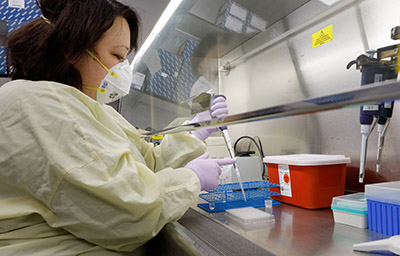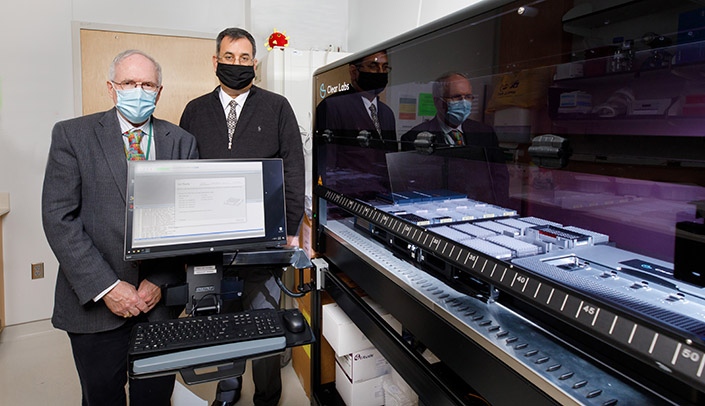A team of scientists at the Nebraska Public Health Laboratory (NPHL) has found mutations to the novel coronavirus in Nebraska by using exclusive, sought-after new technology capable of conducting novel “next generation” whole gene sequencing.
This capability allows the state to track COVID-19 across Nebraska in new and more precise ways — including contact tracing of whether people within populations, like nursing home residents or meatpacking workers, are infected with the same variants of the SARS-
CoV-2 virus.
 |
Elizabeth Mitchell prepares to load the Clear Labs GridION sequencer. |
Sequencing provides a “fingerprint” that allows public health officials to track where the viruses are coming from, where the new mutants are spreading. This provides proof that confirmed cases of COVID-19 reinfection are from the same clone of the virus, or represent a new mutant of SARS-CoV-2
NPHL scientists — all of whom are faculty at UNMC — worked with a California start-up company to validate the automated-sequencing technology and obtain Emergency Use Authorization with the FDA in September 2020.
The variants found by NPHL scientists include “two mutations we think are significant in reducing the ability of the virus to cause infection and severe symptoms,” said Baha Abdalhamid, MD, PhD, UNMC assistant professor of pathology and microbiology.
It’s not uncommon for viruses to mutate, and SARS-CoV-2, the novel coronavirus that causes COVID-19, has produced several significant variants. The viral mutations that NPHL discovered in Nebraska cases have been unique, and were not the UK, Brazil and South African variants that have been in the news.
A mutation in a virus is any change in the genome; a variant is a mutation with a recognized new effect, while not all mutations are bad.
In the case of the Nebraska mutations, the NPHL studied a cluster of elderly patients with COVID-19 in a Nebraska nursing home. They found high-risk individuals who had high levels of the virus, but no symptoms.
Research is continuing on whether the most common, widespread variants, known as the UK, Brazil and South African variants, are “less virulent,” but more contagious. This could increase the number of cases affecting high risk populations, and impact when herd immunity is achieved.
“If we have a more highly transmittable virus,” said Peter Iwen, PhD, director of the NPHL, “we’re going to have to tighten up again to prevent the spread. That’s not what people want to hear.”
But, researchers say, it’s important to know what mutations are occurring and how this is affecting the spread of the virus in Nebraska.
With previous technology, sequencing was limited to a small part of the RNA or genome of the virus. Now, UNMC investigators can see the whole picture, including the details that would indicate whether a sample was of the original SARS-CoV-2 virus or represents a new mutation.
The NPHL has access to this capability thanks to an existing partnership.
“The ability to create effective academic-public-private partnerships has successfully characterized the UNMC clinical and research approach,” said Jeffrey P. Gold, MD, chancellor of UNMC. “This is particularly true since the very beginning of the COVID pandemic. These partnerships clearly accelerate readiness and responsiveness to the dynamically changing landscapes we face every day.”
UNMC collaborated with Clear Labs, a California company, to validate the technology using a new instrument called the GridION nanopore sequencer. One of the most unique features of the GridION sequencer is that it is highly automated, increasing the number of samples that can be processed every day. Many labs across the country are attempting to obtain this technology.
“UNMC shares our commitment to better understand SARS-CoV-2 and its variants, so that we can more accurately track and manage the virus,” said Ramin Khaksar, DVM, PhD, chief scientific officer at Clear Labs. He called the capability “genomic surveillance.”
The sequencing program developed at the NPHL is now analyzing several positive COVID-19 specimens, from across Nebraska, multiple times a week.
At $3,500 per “run” (for 32 specimens), the testing gets expensive quickly, but, researchers say it is crucial that Nebraska know what mutations are occurring in the state, and where and how SARS-CoV-2 is spreading.
The U.S. government is investing more in gene sequencing to fight the pandemic, in partnership with the NPHL.
“Much needed federal funding was recently received to allow the NPHL to support a robust program of sequencing in Nebraska,” Dr. Iwen said.

Thanks for keeping Nebraska safe Dr. Iwen. We appreciate you.
'Great job' to our friends at NPHL. Keeping Nebraska on the cutting edge…
So proud of ALL the above mentioned Drs, researchers, techs and collaborative efforts behind the scenes that went into this to make UNMC on the forefront of technology!
Great work!! Thank you for all you are doing!
Nebraska Public Health Lab-You are a shining star to our State! From the Anthrax events, to West Nile, Flu, and now the COV19 pandemic you have always been willing to work tirelessly to keep everyone safe.